

(Picture - Ray Anderson, Tommy Vance and Russell Thompson)
Ray began by asking Tommy about joining Radio London in the summer of 1967,
during the station's last days. Tommy vividly remembered presenting the final
Fab Forty Show, but unlike many of the people around him in the Big L '97 studio,
he could not recall any of the tracks he'd played. (We were dying to tell him
they included Craise F(r)inton Kirk, plus a segue of two versions of
I Wanna Go Back There Again by Truly Smith and New Formula, plus...)
Tommy had listened to Big L whilst still broadcasting on Caroline. He greatly
admired the type of music played by John Peel in his Perfumed Garden, although
he found it difficult to tune in to the show. The Galaxy and the Mi
Amigo were so close to each other that the output from Radio London's powerful
transmitter tended to swamp the receiver on Caroline and distort the sound.
Tommy and John both ended up as DJs on Radio One, and they worked together on
Top Gear.
Ray:
Radio over the last thirty years has gone off in many directions. Do you think it's gone the right way?
Tommy:
Radio in the UK has in many ways gone backwards. That's always been my feeling. I learnt radio in the United States before I joined Caroline. I worked under two men called Drake and Chinault who ran the RKO radio stations in the US, and they were number one in every market they were in. They were the original 'format' producers and creators. Now a significant amount of radio in the UK still adheres to the same format principles. I like to see what you're doing. [It] is much more freeform, and I think freeform radio would be greater appreciated by the public in this country, [but] maybe not by the bankers who put up the money... I have more fun listening to what you're doing.
Ray:
Do you think there's a place for a station like this on the dial in London, playing maybe, Sixties' cult music?
Tommy:
I think there's a place for radio stations not only in London but throughout the UK, at national or possibly local level, literally doing anything. You have to get your audience. Anyone listening to this radio station right now, or indeed what you did back in the summer, if they liked that style, they would probably find it to be the most exciting aural experience of their lives, instead of just the same old format.A radio station doing what you're doing here would, I believe, succeed, and succeed well within this marketplace. Not only this marketplace but it could be Manchester or Glasgow... anywhere. You're damn right it would work!
Ray:
Nobody else seems to be doing it the way we're doing it. It seems to be announcers working off liner cards [and] the computer. We're sitting here doing it off vinyl, carts, CDs and doing it the old-fashioned way that you did back in the Sixties.
Tommy:
I don't want to get too political, or indeed too negative about it, but in the end it's [about] format. To explain what a liner card is, nowadays it's just text that comes up on a [computer] screen. People read these things because the formula becomes the most important aspect to the investors. I think it's just bullshit, if you want the truth! I think radio is enthusiasm; people going on the air and saying, "Listen to this!" and then, "Ya hear that? Now listen to this!" There's room for a hundred radio stations in London.
Ray:
When you go to New York, the dial is crammed with a choice of stations, AM and FM.
Tommy:
Absolutely. But then we've always been inculcated in this country with the phrase, (affects 'voice of authority') "I'm sorry, but there's no more room on the broadcast spectrum for another radio station." Six months later, "Oh my goodness! We've just found this little, tiny frequency that you could possibly use now."
Ray:
I wish they'd find one for us. We'd take it!
Tommy:
It's not so much that you [should] take it. I think you deserve it.
Pause for musical break and round of applause.
Tommy then spoke about having stayed in touch with Big L original presenters
Mike Lennox, who now lives in Alberta and works in real estate, and Willy Walker,
who resides in Ft Lauderdale, Florida, and captains millionaires' yachts. Tommy
assured us he would be inviting both of them to join us for our summer 1998
broadcast, and would definitely participate himself, work permitting. (Sadly
the proposed RSL didn't happen. Ed)
Our news supremo, John Ross-Barnard arrived with his latest bulletin, which
Ray failed to sabotage by inserting silly noises instead of the customary inter-story
'blips'. Afterwards, John remained in the studio, participating in on-air banter
with Ray, Chris Elliot and Tommy. John and Tommy had worked together both at
the Beeb and at London's Capital Radio.
John: (to Ray)
It's very nostalgic and very charming to be here, and it's a privilege. I appreciate you putting up with me. Thank you.
Tommy:
It's only because you're impeccable, John, and you always have been!
Both John and Tommy, being seasoned raconteurs, continued to entertain us with
hilarious anecdotes of their broadcasting experiences, until it was time for
Tommy to leave.
This was Tommy Vance's farewell to Big L '97
Tommy:
I do hope that the enthusiasm you've always shown is ultimately rewarded in the way that it should be rewarded by the Radio Authority, the people who legislate and can give out licences in this country, and that ultimately you do succeed. Thanks for your hospitality. Prior to retiring, I'll just have a small, red wine...
Chris Elliot:
...and a Big L tee-shirt!